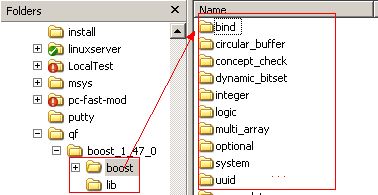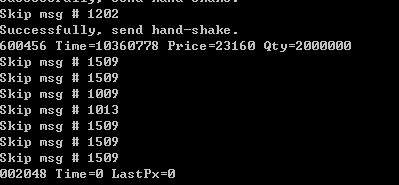编译quickfast解析库(沪深level2行情转码库)
为了方便大家编译和使用QuickFast库,我在GitHub上放置了一个v1.4版本的构建环境:
https://github.com/imharrywu/quickfast
包括了预编译的依赖库(boost, xcerces) 以及工程管理的MPC, 同时生成了一个预编译的库在Output\Release下。
说明一下,对1.4的构建环境稍作了修改:
1,使用MPC4.1,因为需要boost_system
2,全部使用了动态库,官方编译的时候,只有boost_thread使用动态库,感觉不太协调,所以统一全部是动态库.
3,需要boost_date_time, boost_chrono等。
详细步骤请直接看GitHub上的README.md
1) 下载源代码
下载quickfast项目(windows平台):
http://quickfast.googlecode.com/files/quickfast_win_src_1_4.zip
公布一个QQ群:229609210 同行们可以申请加入一起讨论。
2) 下载第三方库和配置脚本
2.1) 下载activeperl
(google it)
2.2) 下载mpc
http://www.ociweb.com/products/mpc
2.3) 下载boost
(google it)
2.4) 下载xerces
http://xerces.apache.org/xerces-c/
2.5) 配置脚本
下载 行情转码库的配置脚本setup.bat(gif文件另存为zip,解压可以得到bat文件)
http://hi.csdn.net/attachment/201112/13/0_1323743665laAL.gif
setup.bat配置脚本设置三方库路径和编译器选项
@REM 1) Customize this file by setting variables to suit your environment @REM 2) Also you should customize QuickFAST.features to enable particular features on your system. @REM 3) Delete the following line when you finishing customizing this file. @REM [==DELETED==]echo See remarks in %0 for information about setting your build environment @REM 4) And, then run the `m.cmd' to generate *.sln & *.vcproj files @echo off REM ===================================================================================== REM EDIT THE FOLLOWING LINES OR SET THESE VALUES IN YOUR ENVIRONMENT BEFORE RUNNING SETUP if "a" == "a%MPC_ROOT%" set MPC_ROOT=H:\workspace\qf\MPC if "a" == "a%XERCES_ROOT%" set XERCES_ROOT=H:\workspace\qf\xerces-c-3.1.1-x86-windows-vc-8.0 if "a" == "a%XERCES_LIBNAME%" set XERCES_LIBNAME=xerces-c_3 if "a" == "a%BOOST_VERSION%" set BOOST_VERSION=boost_1_47_0 if "a" == "a%BOOST_ROOT%" set BOOST_ROOT=H:\workspace\qf\%BOOST_VERSION% REM END OF VALUES TO BE SET REM =====================================================================================
注意:boost默认编译出来的include和lib不在同一个目录下,需要move一下。
3) 生成项目文件
在vc的命令行下,运行这个setup.bat && m.bat就可以生成QuickFast.sln
4) 编译生成QuickFast库
用vs2008打开QuickFast.sln编译连接,生成的文件在Output目录的相应配置文件夹下。
5) 样例程序文档
这个解决方案提供了很多例子,最简单的是TutorialApplication和InterpretApplication这2个例子。
也可以用doxygen生成文档。
http://hi.csdn.net/attachment/201112/26/0_1324861393eteG.gif
6) 行情解码例子程序
楼主用Codecs::SynchronousDecoder(同步解码器,官方例子使用的是异步解码器) 实现了一个简单的解码封装DLL,通过tcp socket从上游数据源获取fast的码流并且解码。
同行们你们主要参考 RunDecoderLoop(...)函数内部的行情解码步骤
这个dll的其他代码都可以忽略, 主要关注 《第七节 行情解码的几个主要步骤》 的内容。
这个例子是一个dll库,导出了一个API,这个API以市场代码等为参数(上海市场解码,或者深圳市场解码),开始各个市场的解码。
同时这个API接受一组回调接口来通知数据消费者来处理解码后的行情数据, 参看 IDataExInterface 定义。
建议大家把2个市场的解码放在2个线程里面,最好分别在2个机房里面。
FAST码流是剥掉了STEP协议头以后STEP协议BODY部分用FAST编码过的内容。
Fast_Steam = Fast(STEP_PACKET -STEP_HEAD) =Fast(STEP_BODY)
导出库的头文件
#ifdef __cplusplus
extern "C"
{
#endif
enum MarketTag
{
ShenzhenMarket = 0,
ShanghaiMarket = 1,
};
struct IDataExInterface /*解码以后的数据通过接口中的pNotify接口来通知客户端更新数据*/
{
void (__stdcall * pfnFeedStatus)(ConnectionStatus connStatus);
// 上海的行情数据通知接口
void (__stdcall * pfnFeed_SHFAST30_UA3202)(const SHFAST30_UA3202_t * );
void (__stdcall * pfnFeed_SHFAST30_UA3201)(const SHFAST30_UA3201_t * );
void (__stdcall * pfnFeed_SHFAST30_UA3113)(const SHFAST30_UA3113_t * );
// 深圳的行情数据通知接口
void (__stdcall * pfnFeed_SZFAST_103)(const SZFAST_103_t *);
void (__stdcall * pfnFeed_SZFAST_202)(const SZFAST_202_t *);
void (__stdcall * pfnFeed_SZFAST_201)(const SZFAST_201_t *);
void (__stdcall * pfnFeed_SZFAST_104)(const SZFAST_104_t *);
};
FASTDECODER_API
int RunDecoderLoop(const char * pIp
, unsigned short nPort
, MarketTag nMarketTag
, const char * templateFileName
, const struct IDataExInterface * pNotify
);
#ifdef __cplusplus
};
#endif
客户端可以这样调用DLL
void Level2Thread(void * arg) // 把各个市场的解码放在各自的线程里面
{
MarketTag nMarketTag = static_cast<MarketTag>((int)arg);
IDataExInterface * pNotify = new IDataExInterface;
memset(pNotify, 0, sizeof(IDataExInterface));
pNotify->pfnFeedStatus = FeedStatus; // 用于报告解码状态的回调
switch (nMarketTag)
{
case ShenzhenMarket:
{
SetThreadAffinityMask(GetCurrentThread(), 1);
pNotify->pfnFeed_SZFAST_103 = Feed_SZFAST_103;
pNotify->pfnFeed_SZFAST_104 = Feed_SZFAST_104;
pNotify->pfnFeed_SZFAST_201 = Feed_SZFAST_201;
pNotify->pfnFeed_SZFAST_202 = Feed_SZFAST_202;
RunDecoderLoop( // 在该线程里面开始深圳市场解码
"127.0.0.1", 1111
, MarketTag(ShenzhenMarket)
, ".\\fasttemplates_2.00.xml"
, pNotify);
} break;
case ShanghaiMarket:
{
SetThreadAffinityMask(GetCurrentThread(), 2);
pNotify->pfnFeed_SHFAST30_UA3113 = Feed_SHFAST30_UA3113;
pNotify->pfnFeed_SHFAST30_UA3201 = Feed_SHFAST30_UA3201;
pNotify->pfnFeed_SHFAST30_UA3202 = Feed_SHFAST30_UA3202;
RunDecoderLoop( // 在该线程里面开始上海市场解码
"127.0.0.1", 2222
, MarketTag(ShanghaiMarket)
, ".\\template.2.03.xml"
, pNotify);
} break;
}
return ;
}
/**
*
* 简单的开启两个市场的解码线程开始解码,
* 导出函数RunDecoderLoop是一个循环解码的阻塞调用过程,
* 所以放在2个独立的线程中。
*
**/ int main(int argc, char* argv[])
{
_beginthread(Level2Thread, 0, (void *)ShanghaiMarket);
_beginthread(Level2Thread, 0, (void *)ShenzhenMarket);
printf("Press any key to quit decoder.\n"); getchar();
return 0;
}
7) 行情解码的几个主要步骤
用Codecs::SynchronousDecoder解码fast的几个重要步骤
7.1) 构造xml解析对象
/************************************************************************ * * 全局的xml解析类 * * 注意: 多线程同时构造parser会资源冲突 * * ************************************************************************/ static Codecs::XMLTemplateParser parser;
7.2) 解析xml模板生成fast模板
/////////////////////////////////////////////
// Parse the templates from the template file
// errors are reported by throwing exceptions
// which are caught below.
std::ifstream tmplFile(templateFileName, openMode);
Codecs::TemplateRegistryPtr registry;
try {
registry = parser.parse(tmplFile);
}catch (std::exception & e){
std::cerr << e.what() << std::endl;
return -1;
}
7.3) 创建一个decoder对象
//////////////////////////////////////
// Create a sync decoder and
// setup attributes.
Codecs::SynchronousDecoder * pDecoder
= new Codecs::SynchronousDecoder(registry);
pDecoder->setHeaderBytes(0);
pDecoder->setResetOnMessage(false);
pDecoder->setLimit(0);
7.4) 实现一个消息消费者,并且注册给解码器
//////////////////////////////////////
// Create an application object to use
// the incoming data. In this case to
// accept complete messages and interpret
// them to standard out.
CMessageConsumerImpl * pHandler
= new CMessageConsumerImpl(nMarketTag
, pNotify
, pDecoder);
//////////////////////////////////////
// and use the interpreter as the consumer
// of generic messages.
Codecs::GenericMessageBuilder builder(*pHandler);
7.5) 开始解码
接收网络数据包(放置在pFastBody, 长度位nBodyLength)
pDataSource = new Codecs::DataSourceBuffer(pFastBody , pFastHeader->nBodyLength);
try{
pDecoder->reset();
pDecoder->decode(*pDataSource, builder);
} catch (std::exception & e)
{
std::cout<<e.what()<<std::endl;
}
delete pDataSource;
pDataSource = NULL;
7.6)实现消息消费者接口
/// @brief A message consumer that attempts to produce a human readable version /// of a message that has been decoded by QuickFAST. class CMessageConsumerImpl : public Codecs::MessageConsumer
重写消费消息函数
virtual bool consumeMessage(Messages::Message & message);
7.7) 消费消息的过程就是消息的格式化过程
在消息的格式化过程中,主要是遍历 Message 的各个 filed ,如果 field 是
一般类型,直接转换成相应的值;如果是sequence和group,则需要将
field转换成sequence和group,遍历;另外,由于sequence里面的每一个
item也是一个Message结构,所以需要以Message的方式遍历结构的每一个成员;
foreach(item in seq)
foreach(member in item)
7.8) 输出
8) 资源下载
=========================================================================
项目源文件下载
(将下面的gif链接另存为zip,解压->重命名->解压,有加密,确实有需要的朋友请留言获取)
=========================================================================
最新版本
version 2.0,修改了日志打印方式和配置文件加载quickfast-v2-[8n0].zip.png
http://hi.csdn.net/attachment/201112/27/0_132498087296Py.gif
历史版本
version 1.0,项目源文件Examples-8n0.zip
http://hi.csdn.net/attachment/201112/26/0_132486187064m4.gif

